


Breaking the mould of the stigma associated with menstruation has always been challenging especially in rural areas. According to the National Family Health Survey, 62% of women in rural areas use cloth, old rags, muds or leaves for menstrual protection. This situation exists not only due to lack of awareness on menstrual hygiene but also of non-access to affordable sanitary pads. This time, the solution proposed by DEF’s Smartpur initiative was not only to create awareness around the topic but also to make affordable sanitary napkins available to the girls and women in the community. Read More

The COVID -19 pandemic affected social, economic, institutional and governance settings in an immeasurable way. In India, it has put a spotlight on economic inequalities and fragile social safety net which forced the vulnerable communities in rural parts, daily wage earners, vendors, shopkeepers etc. to bear the economic brunt of the crises. Reverse migration of workers from cities was an addition. They were denied access to several critical rightful entitlements as citizens Read More

DEF’s Covid-19 Relief Warriors worked tirelessly across backward and rural areas to help build community engagement, trust and provide aid. A team of 10,000+, provided food relief kits, access to information on government schemes, banking and digital services, across 600 locations. They further helped raise awareness about Covid-19, enabled women entrepreneurs and distributed masks, hand sanitizers and tackled misinformation and fake news. Till present, the team provided relief to 2.3 million people, distributed food kits to 122,375 people and reached to 150,000 migrant workers. Read More

The pandemic induced nationwide lockdown had an unprecedented impact on the low wage-earning migrant population across the country. The population was forced to begin arduous journeys back to their villages —cycling or hitching rides on lorries or foot without any basic facilities. Hence, to assess the impact of Covid-19 crisis on them from diverse perspectives, Digital Empowerment Foundation conducted an ‘Ethnographic Study’ on migrant labourers. This involved travelling to most affected states of India—Uttar Pradesh, Bihar and Jharkhand. Over 60 migrant labourers were video interviewed collectively in three states—in their natural habitat which resulted into a documentary film giving first hand visual perspective of their helplessness, hopelessness, pain, anger and agony. Read More
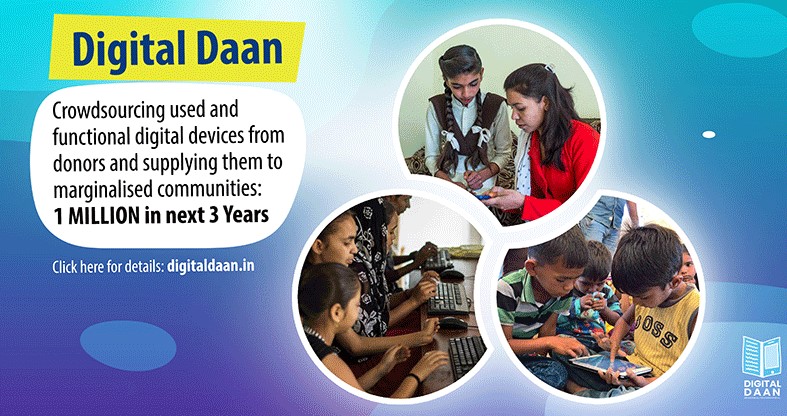
The pandemic has significantly disrupted the education sector- which is a critical determinant of a country’s economic future. In India, 320 million students have been affected by COVID-19 school closures, and though the government quickly recommended shifting to “online teaching,” this ignores India’s immense digital divide—with embedded gender and class divides. In an effort to address the digital divide and promote inclusion, DEF started a movement to collect and encourage people to donate all kinds of old and used (but functional) Smart phones, Laptops, Tablets, Desktop/Computer (Monitors & CPU), Printers, Projectors, Camera & Camera lens through our 700 centres across 25 states and 130 districts located in rural, tribal, marginalized and unreached areas- enabling people in multiplier affect using real-life crowdsourcing. The Digital Daan initiative aims to tackle this issue and crowd source 10,00,000 devices from urban and metro cities and redirect them to rural communities to bridge the digital divide. It will also reach out 50,00,000 learners, primarily children, adolescents, women, underprivileged communities from digitally deprived households and work towards connecting them. Donate for a child’s education. Read More
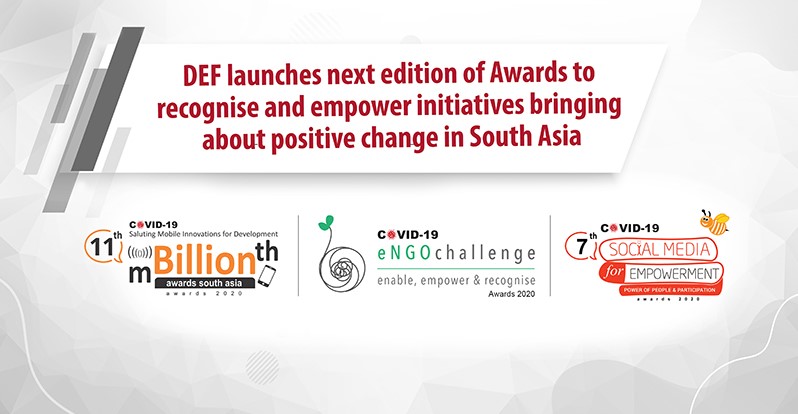
Digital Empowerment Foundation has made a conscious effort to work for the enablement and mass digital empowerment of marginalized and vulnerable communities across the nation. A digital evangelist for over 18 years, our various initiatives have equipped communities with access to information and brought them out of digital darkness. On the path towards connectivity, DEF launched Manthan Awards which has been amalgamated into mBillionth Awards South Asia, Social Media for Empowerment (SM4E) Awards and eNGO Challenge Awards. It aims to recognize, honour and encourage initiatives and social enterprises working towards innovation and community building; thereby creating an ecosystem of innovators to collaborate and scale up across nine South Asian countries – India, Afghanistan, Bangladesh, Bhutan, Maldives, Myanmar, Nepal, Pakistan and Sri Lanka. Read More
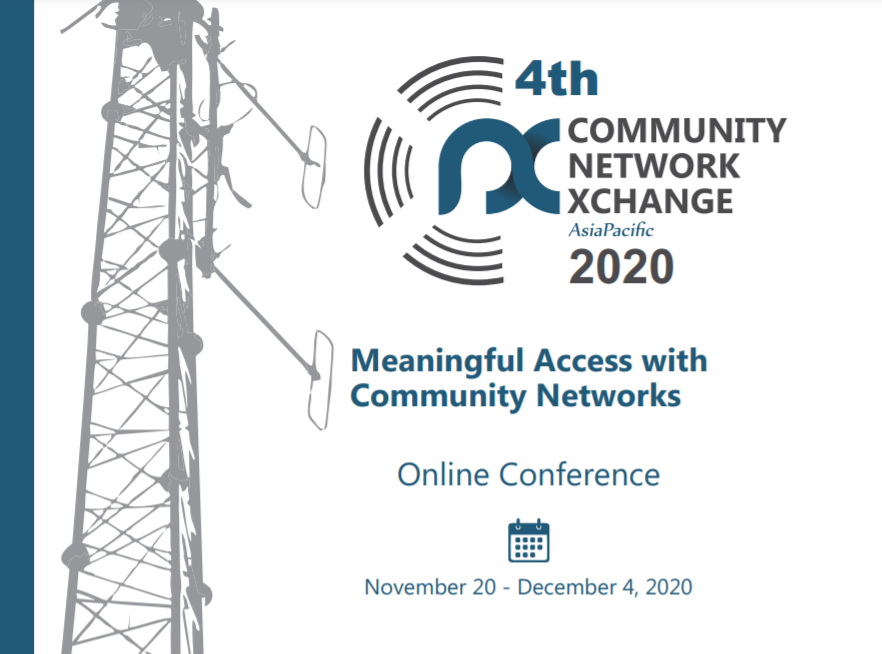
Since 2017, Community Network Exchange (CNX) Asia Pacific has been a platform to discuss the many intricacies of community networks, and the multi-pronged issues that emerge with its deployment and management. CNX 2017, 2018, and 2019, were facilitated with members of the community networks convening in person, across different locations, and discussing the issues at hand. CNXAPAC 2020 took place in a new reality because of the COVID-19 pandemic, the effects of which were felt locally, nationally and globally. Therefore, under the shadow of the pandemic, the theme of CNXAPAC 2020 was "Meaningful Access with Community Networks". It witnessed a shift to an online medium, with conversations taking place over six days, with over 40 participants from 23 countries, joining in for the sessions of the conference. The ten sessions and the concluding Summit Roundtable, explored every nuance around the meaning of connectivity and the role of community networks across different contexts and countries, in our contemporary times. Read More

Internet and other communication services in Jammu and Kashmir were shut down by the authorities’ around midnight of 04 August 2019. The Internet shutdown was imposed ahead of the Government of India’s decision to strip the special status of Jammu and Kashmir under Article 370 and Article 35A of the Indian Constitution and bifurcate the erstwhile state into two Union Territories. The Internet shut down crushed livelihood opportunities, businesses, enterprises, education and healthcare. The report ‘Rights and Risks: Life and Liberty in an Internet Dark Kashmir’ is a semi-journalistic deep dive to understand individual experiences of living under the Internet, information, and communication darkness in Jammu and Kashmir. Read More






With the onset of winter, the most impacted are the ones living on the streets. The people are vulnerable to such extent that they only have sacks to keep themselves warm. DEF-USIPI Hyderabad Digital centre team realized this and decided to provide them blankets to ease out their suffering. The members visited Abids, King Koti, Narayana Guda, RTC Crossroad, Chikkadadpally and Kachi Guda railway station area to help the vulnerable in need.
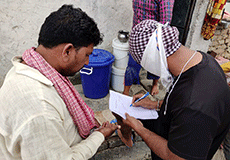
The government announced that ration kits will be provided to daily wage laborers. To help speed up the process our co-ordinator Gurudev Singh in Alwar, Rajasthan, along with Ward councilor immediately prepared a list of those who are in dire need of these benefits. He created a kit which includes 500gms cooking oil, 500gm lentils, 5kg wheat and 1 kg rice which is being distributed. Similarly, our coordinators in Haryana and Bihar created a task force who have got permission from the district collector to help with community outreach, mobilisation & distribution of necessary items.

Under Digital Emergency Relief Program, Smartpur project team in Haryana, worked tirelessly to provide basic essentials and government entitlements to all those in need because of the Covid-19 situation. During this time of lockdown, the reach by the Smartpur team to the locals of the community, especially the target beneficiaries, was next to impossible. However, Smartpur Digital Service Delivery Van provided services in order to help those in need. They created awareness in surrounding villages of the Mewat region by distributing masks and also provided ration to the needy.

Through government scheme linkages, Mazhrul Islam, coordinator of USIPI-CIRC Digital Centre in Ranchi, ensured the distribution of free gas cylinders under Ujjwala Scheme to help women not fall back to cooking food using firewood in those financially strained times. Ujjwala scheme under central government encourages households to opt for LPG cylinders to help them shift from using firewood. Under the covid-19 relief package by the central government, the women beneficiaries of Ujjwala scheme got free cylinder for three months if they run out of gas. Mazhrul Islam has helped in providing linkages to nearly 300 people.


The pandemic has significantly disrupted the education sector. More than 320 million students have been affected by COVID-19 school closures, and though the government quickly recommended shifting to “online teaching,” this ignored India’s immense digital divide. In rural households, out of 66% of the population, only 14.9% had access to smartphones. Therefore, in an effort to address the digital divide and promote inclusion, DEF established a centre equipped with Ipads in Adilabad (Ghazipur, UP) for imparting Digital Education to the children under Digital Daan programme. Take a step towards making rural India digital and support us by donating device at https://www.digitaldaan.in/. Donate for a child’s education

STEM is an interdisciplinary approach to learning where academic concepts are integrated with real-life lessons. STEM literacy helps in inculcating leadership skills, computational thinking and problem-solving skills in the girls and thereby exposing them with the opportunity of hands-on and real-world learning experiences, thus, breaking gender stereotypes. Tamil Nadu’s Karimnagar district is home to a young software engineer aspirant who is also breaking gender stereotypes. An ambitious 17-year-old M. Srija is passionate about mathematics and machines, and the STEM classes are usually the best part about her day. Read More

The pandemic induced lockdown brought many challenges to the normal functioning of life. It also had a great impact on the education sector as due to restrictions in physical meetings, learning shifted completely from offline to online. Therefore, under English and Digital for Girls’ Education (EDGE), a programme by the British Council and Digital Empowerment Foundation initiated learning through WhatsApp groups also termed as “EDGE WhatsApp Clubs”. With the aim to inculcate English and Digital skills among the girls of marginalized communities in Uttar Pradesh and Vizag, activity-based training was imparted via WhatsApp for three weeks.

Digital Empowerment Foundation and UWD (United Way of Delhi), a charitable society collaborated to impart digital literacy among the women and adolescent girls of urban and semi-urban areas. The programme will also enable them to use IT-related applications, thereby enhancing livelihoods. The target is to reach 2000 women and adolescent girls of 14-44 years of age. The workshops are conducted, keeping all COVID 19 norms in mind.

Digital Empowerment Foundation in partnership with USAID and DAI has launched a one-year programme – “Digital Sarthak”, a digital skilling programme to train 10,000 Women Entrepreneurs and 500 Women-led Community Development Organizations from 7 states of 10 districts in India. The objective of the programme is to strengthen and build the digital capacity of Women Entrepreneurs and Women-led CDOs, so that they can connect online and expand their livelihood opportunities. Read More


DEF’s Covid-19 Digital Emergency Relief Program which provides aid in public schemes, information dissemination, entitlement facilitation and its delivery apart from providing essential items like ration and medicines. One of our SoochnaPreneurs in Jharkhand collaborated with the local authorities to distribute cooked food to children and the elderly under "Didi Kitchen Yojna" of Jharkhand government. The SoochnaPreneur is also a self-help group member who was roped in to carry out this work at village level. This has also helped the women of the group to have an alternate livelihood in times of the corona virus pandemic.

DEFs Samarth SoochnaPreneurs have gone one step ahead to extend help to their communities in times of covid-19. According to a DEF survey, there is a huge lack of masks and sanitisers in rural India. Two of our Samarth SoochnaPreneurs- Sudama Mahto and Bishtu Mahto-undertook the task of making masks to help bridge this gap. They prepared nearly 400 masks and distributed them among the frontline workers, security persons and to those in need. The head of the local administration provided them with the raw material to help them in this and ensure the protection of the community.

Krishna Ram lives with his wife in Barmer, Rajasthan. He has no children and has already been retired for a year and so. There were mistakes in his Aadhaar card, because of which he was not able to receive his pension. Since the problem were beyond his understanding, he had already given up on this pension. However, his wife’s situation was much better, as she recently started getting Rs 500 per month under the old age pension scheme. Even though this money was not much, it took care of the basic needs. Owing to various other family problems, illiteracy and fear of documentation work; he was not able to engage in the formalities required for availing the benefits of the scheme. Read More

The lockdown induced pandemic has made life tougher for everyone, but especially for underprivileged communities living in digital darkness. Jasub Mirana is one among thousands of people who grew financially weak amid the pandemic. A poor 51-year-old labourer from Barmer, Rajasthan, he was unable to avail any government scheme due to lack of documents. With no job opportunity in sight and medical bills of his seriously ill wife piling up, Jasub was struggling to keep up with even basic expenses. Few weeks later he came across SoochnaPreneur Sahiba Khan as she was on her door-to-door visit. He told her about the situation and also revealed how his was the only house... Read More

Ramabai lives with her two boys, Sitaram and Radhe, in Madhya Pradesh. The sole breadwinner due to her husband’s untimely death, she struggles to make ends meet. Working as a wage laborer, she wishes to provide the best education to her sons and is prepared to fight her way through anything. To make her living conditions better, Ramabai decided to seek help for resuming construction of her house under the Pradhan Mantri Awas Yojana. It had come to a halt due to some pending payment after her husband’s death. DEF’s Samarth Soochnaprenuer Deshraj Singh Rajput assisted her in filling out an application to avail the government scheme and also advised her to apply for a widow pension. Read More

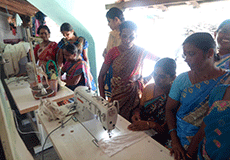
Fifty kilometers from Trichy is a town called Musiri which is home to over 5000 weavers. They make silk and cotton sarees or veshti. However, many shifted to powerloom and those who could not afford are struggling to make their ends meet. So much so that, a powerloom weaver earns around Rs.65 per saree and make five sarees a week, but a weaver who makes sarees on handloom earns around Rs 350 per saree and is only able to make three sarees a week. But after her husband passed away it was getting difficult for her to manage her household expenses. Nirmala took up tailoring classes at Digital Empowerment Foundation’s Manamedu Center. Read More

DEF with Udhyam Learning Foundation conducted training on Digital Skill Building of Nano and Small women Entrepreneurs in Bengaluru. The aim was to enhance digital skills like effective use of smartphone apps; digital marketing and inventory management of urban and semi-urban entrepreneurs to enable them to connect with the digital world and to augment her earnings by leveraging the positivity of digital connect. Through hands-on training and activities, they were encouraged to access the information as per their need. This will not only enable them to take an informed decision about livelihood but also help advertise products and expand clientele.

Under Digital Cluster Development Program (DCDP) keeping in mind the pandemic, our local team started working on spreading awareness on corona virus and simultaneously meeting the need of masks. In this regard, DCDP Barpali first started with 15 community members by providing raw materials and wages. Till now, they have produced more than 0.1 million masks and distributed it to community members for free or at minimal cost. We also reached out to local health centres, medical shops and municipality to supply the same. Similarly, model is replicated in Nuapatna and Musiri clusters.

Digital Empowerment Foundation (DEF) through its flagship programme Chanderiyaan has been demonstrating the power of digital intervention to improve the financial status of traditional artisans of Chanderi in Madhya Pradesh and creating a model for traditional-skill based clusters for over 10 years now. But the Covid-19 pandemic and the country-wide lockdown adversely affected the weaver’s community with no specific government relief for the handloom clusters. Muzaffar Ansari, a representative of DEF from Chanderi, was part of the first batch of weavers of this digital intervention. Ansari, famously known as Kalle bhai, is a local celebrity who is a certified government tour guide and calligrapher.

The weavers’ community is one of the worst hit during this pandemic. Nuapatna in Cuttack district is a cluster of some of the most talented weavers and national awardees. It is home to more than 5,000 weavers who make intricate ikat designs on silk and Tassar, many using natural dye on sarees, stoles and dupattas — sometimes taking years at a stretch to be made. But Covid-19 adversely affected their livelihood. DEF with the help of local NGOs distributed ration kits to 82 families who do not have a ration card needed to avail ration under government’s covid relief package.


Roti, Kapda, Makan (trans. Food, Clothing, and Shelter) has been the refrain resonating throughout India’s tryst with social and economic development from Independence until the present times. These basic needs characterize the modalities of survival and their acquisition signals a foot out of the threshold of poverty. Today, despite significant progressive steps towards social and economic development India still suffers from pervasive income inequality – currently undergirded by connectivity, access to internet, and digital devices. This is because the architecture of governance and public service delivery has come to depend on digital infrastructures. Read More

COVID-19 pandemic has further fractured India's complex information ecosystem. The scoping survey conducted by DEF on pandemic related misinformation circulating within communities received 378 responses from 15 states in India. The survey showed four major categories of misinformation: fake medical advice, Islamophobia, rumours about consumption of certain food and poultry and conspiracy theories undercut by uncritical belief. One of the most important findings of this exercise was that misinformation not only spreads through social media platforms but also through word of mouth within personal networks, public meeting spaces, and informal interactions. The article is available in both English and Hindi.
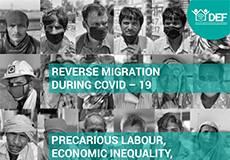
The migrant crisis that has unfolded in the wake of COVID – 19 has thrown into sharp relief how deeply economic vulnerabilities entrenched and precocities were and how inadequate existing institutional and administrative frameworks are in dealing with crises and disasters. The article is the product of relief services provided by the Digital Empowerment Foundation (DEF) near the KMP Highway and the conversations that the staff had with migrant workers passing by. This article has aimed to understand the precocity that circumscribed the lives of this labour force. Read More

India’s rapid digital expansion in the field of social media has led to an unprecedented increase in cases of online sexual harassment. The report is the product of a survey conducted by Digital Empowerment Foundation across four states of India. It aims to understand Cyberbullying through the experiences of people, their understanding of the term, its effect on them, their ways of coping upon being Cyberbullied and finally the changes they think must be brought to improve the efficiency in the mechanism to counter Cyberbullying. The report has been written by Vidhisha Lal and Anoushka Jha. Read More

The Research and Advocacy department of Digital Empowerment Foundation produced a report on ‘Improving Livelihoods of Rural Weavers through Digital Training’ based on training provided by DEF and Commonwealth of Learning to 2000 weavers and artisans across 8 states – Andhra Pradesh (Prakasam), Karnataka (Chamrajanagar), Madhya Pradesh (Ashok Nagar), Odisha (Bargarh, Cuttack), Rajasthan (Barmer), Tamil Nadu (Kanchipuram, Trichy), Uttar Pradesh (Barabanki) and West Bengal (Murshidabad). The training provided knowledge of ICT tools and critical digital skills to the artisan and weaver community during the COVID-19 pandemic. Read More


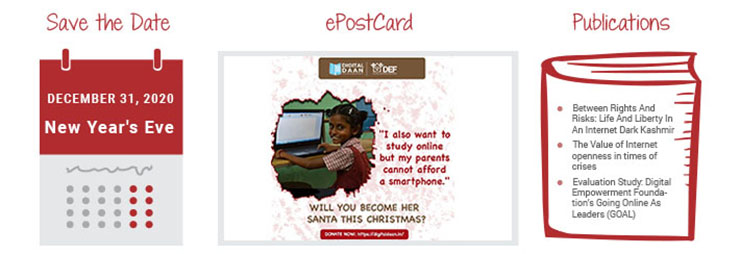

Officer- Research & Advocacy
Digital Empowerment Foundation


India has been under lockdown since March 24, 2020 to break the spread of Covid-19 infection. While it is the only solution to avoid community spread, many like migrant workers, marginalised communities and poorest of the poor are adversely affected due to the lack of information. Smartpur Centres across 117 locations in India has rigorously responded to the crisis by reaching out to the most vulnerable communities. After mapping the needs of the communities in rural regions, Smartpur centres identified that the immediate need was for information dissemination and creating awareness on Coronavirus, its symptoms and preventive measures. Further, awareness around the relief package, Prime Minister Gareeb Kalyan Yojana, was raised through Smartpur Digital Mobile Van, Public Address system and WhatsApp groups. These measures were initiated in Nuh Haryana), and later replicated in other Smartpur locations. This proved to be one of the most effective ways of disseminating information and ensuring social distancing. Simultaneously, the Smartpur teams created a Covid19 relief kit Read More
House No. 44, 3rd Floor, Kalu Sarai, New Delhi | def@defindia.net | www.defindia.org | +91-11-26532786



